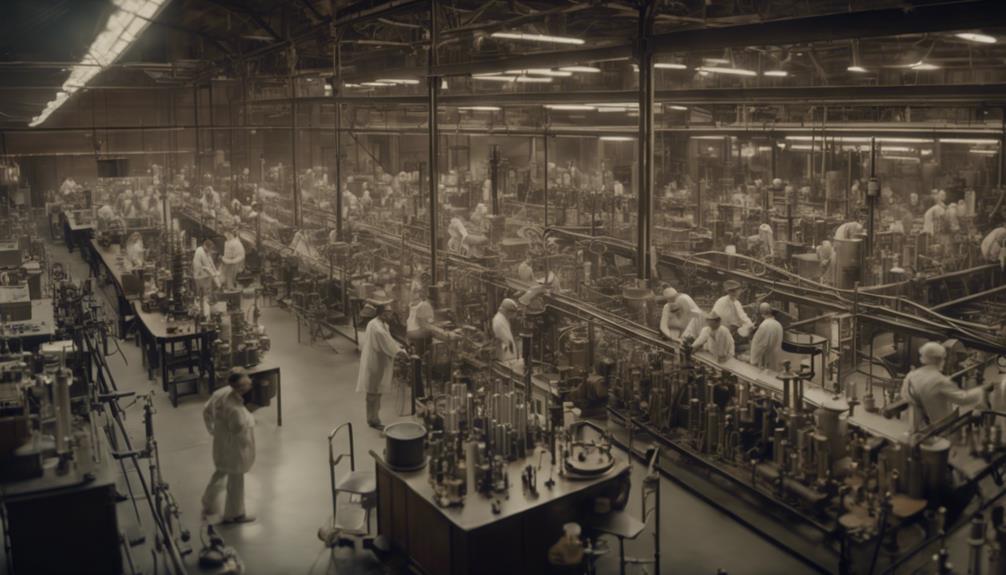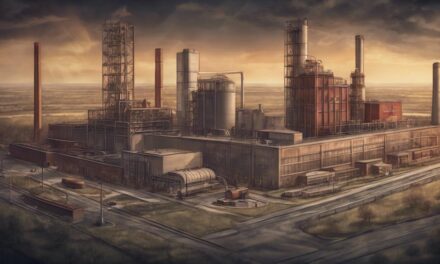Did you know that Dow Chemical's production capacity expanded by over 400% during World War II? This remarkable growth highlights the company's strategic importance and operational prowess at a critical time. However, Dow's history isn't just about wartime contributions; it also includes controversial moments, like its involvement in the Vietnam War. You might wonder how a company can balance its business interests with ethical responsibilities. Understanding Dow Chemical's journey offers insights into the broader implications of corporate actions in both global conflicts and peacetime advancements.
Key Takeaways
- Founded in 1897, Midland Dow Chemical was pivotal in the development of the modern chemical industry.
- Played a crucial role during WWII by supplying essential chemicals for aircraft and munitions.
- Grew significantly post-WWII with international expansion and sales exceeding $2 billion by 1971.
- Faced ethical controversies for supplying napalm B and Agent Orange during the Vietnam War.
- Continues to innovate with a focus on sustainability and environmental stewardship in its operations.
Founding and Early Years
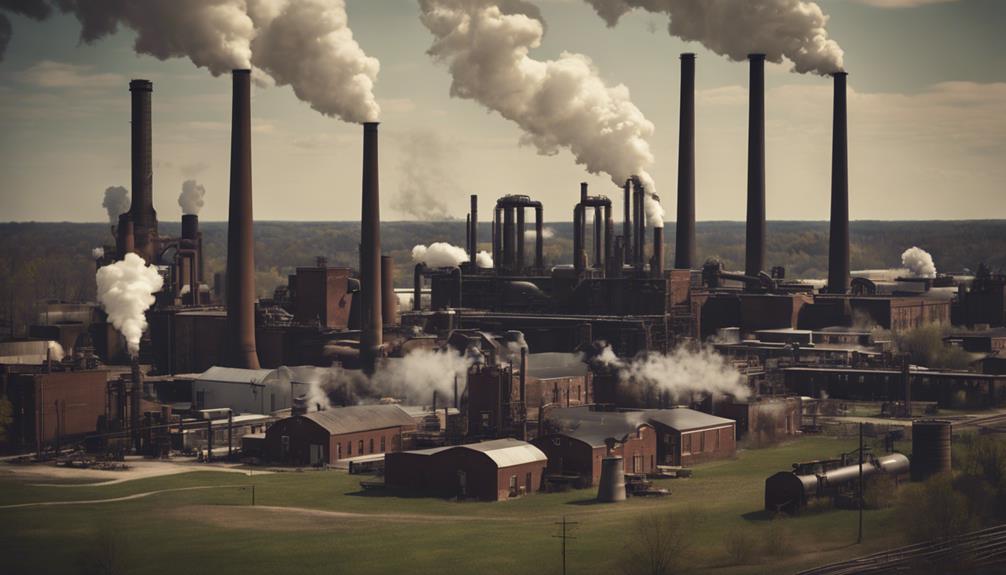
In 1897, chemist Herbert H. Dow founded Midland Dow Chemical in Midland, Michigan, merging Midland Chemical Company and Dow Process Company three years later to form The Dow Chemical Company. At the time of its founding, the company focused primarily on producing bleach, potassium bromide, and other essential chemicals. These products were revolutionary for various industries, marking the beginning of Dow's significant impact on the chemical manufacturing sector.
Herbert H. Dow's vision wasn't limited to just these initial products. His innovative spirit drove the rapid diversification of Dow's product line. By leveraging the natural resources available in Michigan, the company expanded to include phenol, magnesium, and other industrial materials. This diversification was pivotal for establishing Dow as a resilient and versatile chemical manufacturer.
The founding of Midland Chemical Company under Dow's leadership was a strategic move that laid the groundwork for future growth. Dow's ability to identify and harness local resources played a significant role in the company's early success. His approach combined scientific expertise with practical business acumen, setting a standard for the company's operations.
World War II Contributions
During World War II, Midland Dow Chemical greatly bolstered the war effort by supplying essential chemicals and materials, thereby enhancing the Allied forces' capabilities. One of the most pivotal contributions was the production of magnesium. This lightweight metal was critical in constructing aircraft and munitions, directly impacting the efficiency and effectiveness of the war industry. The availability of magnesium allowed for the production of lighter, more agile aircraft, which was a significant advantage in aerial combat.
The vision of Herbert Henry Dow, the founder, played a significant role in positioning the company as a key supplier during the war. His emphasis on innovation and industrial growth laid the groundwork for Dow Chemical's capacity to meet the high demands of wartime production. By ensuring a steady supply of magnesium and other essential chemicals, Midland Dow Chemical helped sustain the Allied war machine, thereby contributing to the eventual outcome of the conflict.
Furthermore, the company's commitment to national defense during this critical period showcased its ability to adapt and respond to global needs. The efficient production and distribution of chemicals by Midland Dow Chemical were instrumental in expanding the war industry, thereby enhancing overall war efforts. This level of industrial support wasn't just about meeting immediate needs but also about ensuring long-term capabilities and resilience.
In analyzing Midland Dow Chemical's contributions during World War II, it's clear that the company's efforts were a reflection of its strategic foresight and operational efficiency. The role it played in supporting the Allied forces underscores the significance of Herbert Henry Dow's legacy and the company's historical impact on national and global scales.
Post-War Expansion
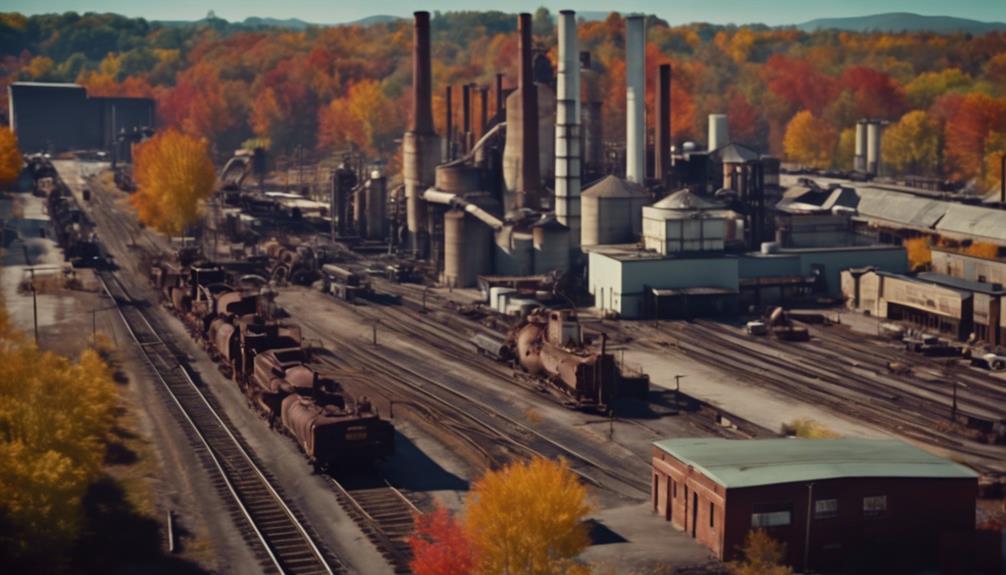
Building on its pivotal role during World War II, Midland Dow Chemical started a substantial post-war expansion, beginning with the construction of its first plant in Freeport, Texas, in 1940. This chemical plant quickly became Dow's largest site and a symbol of the company's growth and strategic positioning. By establishing this facility, Dow leveraged its wartime expertise in chemical production to meet the burgeoning demands of a peacetime economy.
Dow's expansion didn't stop with domestic growth. The company extended its reach into international markets, recognizing the importance of global presence. In 1952, Dow established its first overseas subsidiary in Japan, a strategic move that positioned the company to capitalize on Asia's post-war industrial surge. This international expansion was a clear indicator of Dow's vision to become a global leader in the chemical industry.
The company's strategic positioning paid off significantly. By 1971, Dow's sales had exceeded $2 billion, underscoring the success of its expansion efforts. This impressive growth wasn't just a result of building new plants but also through strategic acquisitions and mergers. For instance, the purchase of Rohm & Haas Co. in 2008 bolstered Dow's product portfolio and market presence, ensuring it remained competitive and innovative.
Dow's post-war expansion was marked by a series of calculated decisions that solidified its position as a key player in the global chemical industry. From the establishment of the Freeport chemical plant to its international ventures and strategic acquisitions, Dow demonstrated an unwavering commitment to growth and innovation.
Vietnam War Controversies
Dow Chemical's role in supplying napalm B during the Vietnam War underscores the complex ethical dilemmas faced by companies involved in the production of controversial weaponry. Napalm B, a mixture of Styrofoam and gasoline, was utilized by the U.S. military to devastating effect, targeting enemy positions and supply lines. The incendiary properties of napalm caused immense destruction, leading to severe civilian casualties and prompting widespread protests against Dow Chemical's involvement.
As napalm B rained down on Vietnamese villages, the line between military targets and civilian areas blurred, bringing to light the harsh realities of modern warfare. The use of such a weapon raised critical moral questions. How responsible are corporations like Dow Chemical for the end use of their products? The ethical implications became a focal point for debates about the morality of war tactics that inflict suffering on non-combatants.
Additionally, Dow Chemical's involvement extended beyond napalm. The company was also a key supplier of Agent Orange, a herbicide used to defoliate forests and crops in Vietnam. While intended to disrupt the enemy's food supply and cover, Agent Orange had catastrophic long-term health effects on both the Vietnamese population and American soldiers, further complicating the ethical landscape.
You're left to ponder whether the pursuit of national security justifies the collateral damage inflicted by such weapons. The legacy of Dow Chemical's role during the Vietnam War is a stark reminder of the perpetual tension between military objectives and humanitarian considerations. It highlights the enduring responsibilities that companies must bear when their products are used in warfare, especially when those products lead to significant human suffering.
Environmental Impact
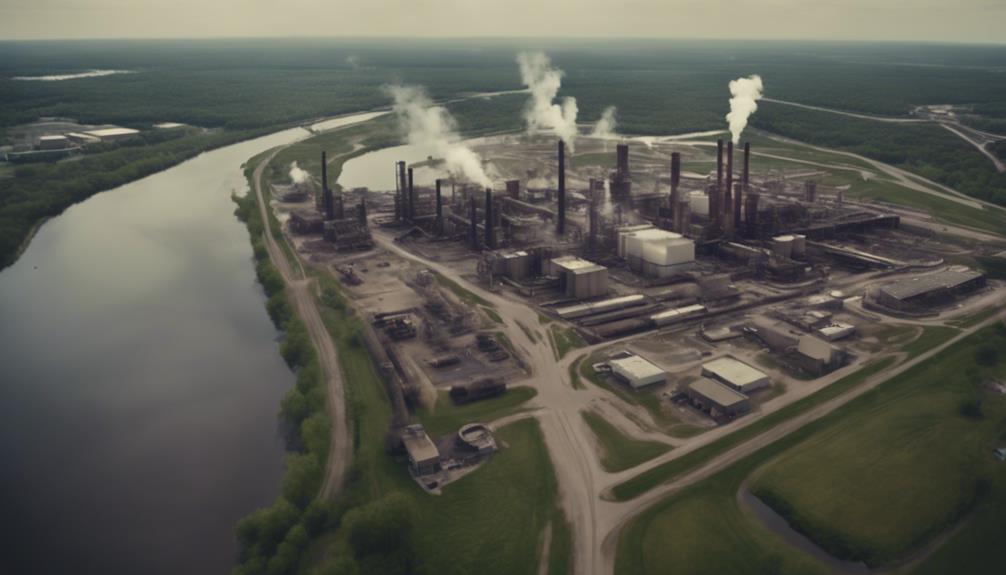
The devastating human toll of napalm and Agent Orange produced by Dow Chemical during the Vietnam War was paralleled by significant environmental destruction, illustrating the far-reaching consequences of chemical warfare.
Napalm, a flammable liquid used in incendiary bombs, caused widespread fires that decimated forests and agricultural lands. The intense heat and prolonged burning resulted in long-term soil degradation, making it difficult for vegetation to regrow.
Agent Orange, a herbicide containing dioxin, was used to defoliate forests and destroy crops in Vietnam. This chemical warfare tactic had dire environmental consequences. Over 19 million gallons of Agent Orange were sprayed over several million acres of land, leading to extensive deforestation and loss of biodiversity. The dioxin in Agent Orange is highly toxic and persistent in the environment, contaminating soil and water sources. This contamination has led to long-lasting ecological damage, affecting not just plant life but also animal species and human communities.
Dow Chemical's role in producing these chemicals has highlighted the critical need for responsible manufacturing practices. The environmental impact of napalm and Agent Orange underscores the importance of sustainability and environmental stewardship in the chemical industry. Companies must consider the long-term ecological effects of their products to prevent such widespread devastation.
Midland Dow Chemical's history serves as a stark reminder of the environmental costs of chemical warfare. The extensive damage caused by napalm and Agent Orange illustrates how chemical production can lead to irreversible ecological harm. This history urges contemporary industries to prioritize environmentally safe practices to avoid repeating such catastrophic impacts.
Legal Challenges
Facing numerous legal battles, Midland Dow Chemical has encountered noteworthy challenges that have shaped its corporate trajectory and public perception. One of the most notable controversies involves the production of Agent Orange, a herbicide used during the Vietnam War. The Dow Chemical Company, as a key manufacturer, faced extensive litigation from veterans and civilians exposed to the chemical. This resulted in a $180 million settlement fund established to compensate the victims, marking a substantial financial and reputational impact on the company.
The legal landscape for Dow didn't stop there. Dow Corning, a subsidiary of Dow, was embroiled in litigation over silicone breast implants. Thousands of lawsuits were filed by women alleging health complications, eventually driving Dow Corning into bankruptcy. The company agreed to a significant settlement with plaintiffs, highlighting the severe consequences of product liability issues.
Another major legal hurdle involved Union Carbide, which Dow acquired in 2001. The Bhopal disaster, one of the worst industrial accidents in history, resulted in a settlement of $470 million. This event added another layer of complexity to Dow's legal challenges and has been a long-standing issue in its corporate history.
Additionally, Dow faced lawsuits over the production of DBCP, a pesticide linked to severe health issues, and although damages were awarded, they weren't collected due to jurisdictional complexities.
Lastly, the Dow Chemical Company was implicated in a tax shelter transaction dispute and a polyurethane price-fixing scheme, culminating in an $835 million settlement in 2016. These legal challenges underscore the multifaceted and often turbulent legal environment that Dow has navigated, shaping its policies and operations significantly.
Corporate Restructuring
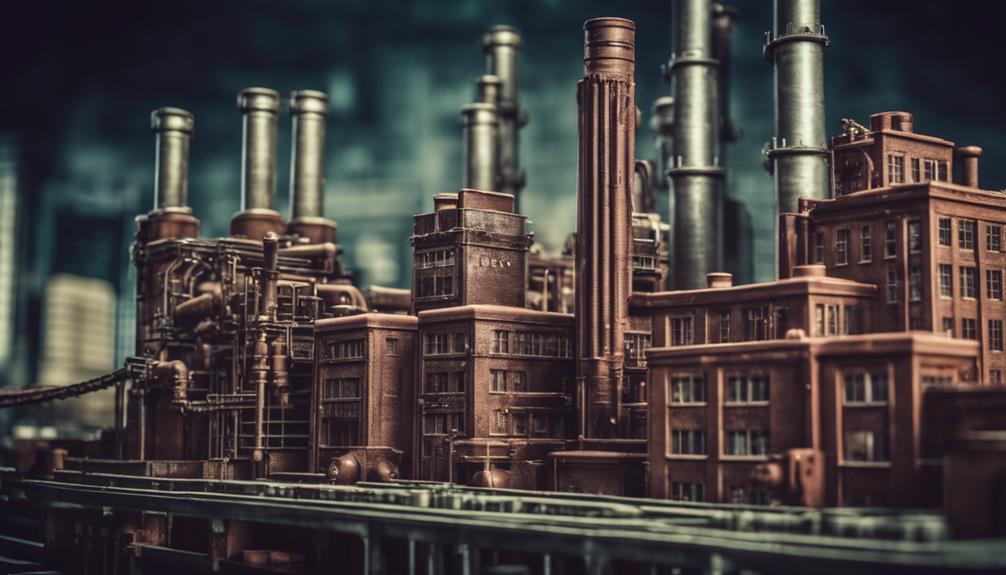
Embracing strategic mergers and acquisitions, Midland Dow Chemical has undertaken corporate restructuring efforts to enhance its market position and innovation capabilities. These initiatives haven't only expanded Dow's product portfolio but also reinforced its research and development infrastructure, driving sustained growth and competitiveness.
A landmark moment in Dow's corporate restructuring history was its 2015 merger with DuPont Company, forming DowDuPont. This merger was a calculated move to leverage the strengths of both companies, creating a more diversified and robust entity. The union aimed to streamline operations, reduce costs, and enhance innovation by combining resources and expertise from both firms. DowDuPont's formation was a pivotal step in positioning the Company as a leader in the chemical industry.
Another significant corporate restructuring effort was Dow's acquisition of Rohm & Haas in 2009. This strategic move allowed Dow to broaden its specialty chemicals segment, tapping into new markets and expanding its customer base. The acquisition showcased Dow's proactive approach to growth through targeted mergers and acquisitions. By integrating Rohm & Haas's advanced technologies and product lines, Dow strengthened its competitive edge and innovation capacity.
These corporate restructuring efforts reflect Dow's commitment to evolving with market demands and technological advancements. The Company's strategic mergers and acquisitions have been instrumental in shaping its trajectory, ensuring it remains at the forefront of the chemical industry.
Technological Innovations
Midland Dow Chemical's pioneering innovations in chemical processes and materials have revolutionized multiple industries, showcasing the company's unwavering commitment to technological advancement. You've likely seen how Dow Chemical's dedication to pushing the boundaries of materials science has made a significant impact on the chemical industry. By developing new chemical processes and products, Dow hasn't only enhanced its own capabilities but also set new standards for the industry at large.
One of the cornerstone achievements of Dow Chemical is its development of advanced polymer materials. These materials have applications ranging from consumer goods to high-performance industrial components. By innovating in materials science, Dow has provided industries with more durable, efficient, and cost-effective materials, thereby driving technological advancements across various sectors.
You've probably noticed the profound influence of Dow's innovations in everyday products. From packaging materials that extend the shelf life of food to adhesives that improve the durability of construction projects, the technological advancements spearheaded by Dow have practical, far-reaching applications. This focus on practical, scalable solutions has solidified Dow's reputation as a leader in the chemical industry.
Moreover, Dow's work in developing sustainable chemical processes can't be overlooked. The company has continually invested in research and development to create eco-friendly alternatives to traditional chemical processes. This dedication not only addresses environmental concerns but also ensures that Dow remains at the forefront of technological innovation in the chemical industry.
Global Influence

While Dow Chemical's technological innovations have set industry standards, their global influence underscores the company's extensive reach and impact on various industries across more than 150 countries. The sheer scale of Midland Dow Chemical's operations, with manufacturing plants spanning continents, demonstrates its ability to influence global markets and contribute substantially to local economies. Employing tens of thousands of people worldwide, Dow Chemical not only drives economic growth but also fosters community development in regions where its facilities operate.
One of the key figures behind this global expansion was Herbert Dow, whose vision laid the groundwork for the company's international reach. Under his leadership, Dow Chemical pursued a strategy of acquisitions and mergers, enabling it to strengthen its market position and diversify its product portfolio. This approach allowed Dow to absorb smaller chemical companies and integrate their innovations, thereby expanding its influence across various sectors, from agriculture to electronics.
However, Dow's global influence isn't without controversy. The company's involvement in producing Agent Orange during the Vietnam War is a notable example. This herbicide, used by the U.S. military, had long-lasting environmental and health impacts, sparking significant debate and scrutiny over ethical practices within the chemical industry. This episode serves as a reminder of the responsibilities that come with global influence, particularly for chemical companies whose products can have far-reaching consequences.
Despite these challenges, Dow Chemical's ability to innovate and adapt to changing global markets underscores its enduring significance. The company's extensive reach and diversified operations highlight its role as a pivotal player in the global chemical industry, shaping technological advancements and economic landscapes worldwide.
Future Prospects
As you look to the future, you'll see that Dow Chemical is committed to driving innovation and achieving ambitious sustainability goals.
The company's plans for global market expansion emphasize not just growth, but also a steadfast dedication to environmental responsibility.
Innovation and Sustainability Goals
Focusing on innovation and sustainability, Dow Chemical's future prospects are centered around responsible resource management and pioneering eco-friendly solutions. In the United States, Dow has historically been known for developing a range of chemicals, including the controversial chemical defoliant used during the Vietnam War. However, the company has since shifted its focus to new technology aimed at reducing environmental impact.
Dow's commitment to sustainability is evident in its innovative approaches. The company leverages cutting-edge technology to responsibly utilize untapped resources, ensuring a sustainable business model for the future. For instance, Dow is investing in renewable energy sources and developing biodegradable materials that minimize waste. These efforts underscore the company's dedication to reducing its carbon footprint and promoting environmental stewardship.
Team Dow's vision for the future involves dreaming bigger and bolder. By prioritizing sustainability goals, Dow aims to create more eco-friendly products and processes. This forward-thinking approach not only aligns with global environmental standards but also sets a benchmark for the chemical industry.
As Dow continues to innovate, its focus on sustainability will likely lead to groundbreaking advancements that benefit both the environment and society at large.
Global Market Expansion Plans
Dow Chemical's robust history of global market expansion positions the company to leverage its extensive international presence and strategic partnerships for future growth. Since founding its first overseas subsidiary in Japan in 1952, Dow has established plants in over 150 countries, proving its capability to adapt and thrive in diverse markets. This strategic move laid the groundwork for global expansion, particularly in the post-World War II era when international trade surged.
By 1971, Dow's sales exceeding $2 billion underscored its successful penetration into overseas markets. The company's acquisition of Rohm & Haas Co. in 2008 for $15.4 billion notably expanded its product portfolio and market reach. This acquisition demonstrated Dow's commitment to growth through strategic investments, positioning it as a major player in the global chemical industry.
Moreover, the joint venture with Petrochemical Industries Co. (PIC) to form K-Dow, valued at $9.5 billion, highlights Dow's proactive approach in forming alliances that enhance its global footprint. By acting as an agent of innovation and collaboration, Dow continues to strengthen its market position. These strategic initiatives make sure Dow is well-prepared to capitalize on future opportunities in the global market.
Frequently Asked Questions
What Is Dow Chemical Famous For?
Imagine a tree with deep roots and sprawling branches. That's Dow Chemical for you. It's famous for its significant environmental impact and impressive product innovations.
From humble beginnings, it's grown into a giant in the chemical industry, driving market growth globally. By diversifying its product line and expanding through strategic acquisitions, Dow Chemical has cemented its place as a leading force in the world of chemicals.
What Is the History of the Dow?
You'll find that Dow Chemical's history starts with Herbert Dow, who founded the company in 1897 in Midland, Michigan, despite his Canadian origins.
Dow Chemical quickly gained attention for its pioneering innovations, diversifying its product line within two decades.
The company's critical role during World War I and the introduction of plastic resins in the 1930s underscore its tradition of innovation and rapid diversification, shaping its historical significance.
Why Is Dow Chemical in Midland?
Imagine Midland's ancient ocean as a treasure chest bursting with untapped resources. You find Dow Chemical in Midland because Herbert Henry Dow saw this potential and decided to harness it.
The company headquarters remain there, deeply rooted in Midland origins. Dow's presence has had a profound local impact, transforming the community and fueling economic growth by shifting from mere salt production to extracting valuable elements like magnesium and chlorine.
What Is the History of Dow Corning Company?
You're asking about Dow Corning's history.
It began in 1943 as a joint venture between Dow Chemical and Corning Inc. to focus on silicone innovation. They made significant strides in silicone technology, including medical devices.
However, their environmental impact and legal issues from silicone breast implants led to bankruptcy in 1995. They settled claims by 2012 and restructured in 2004, separating from Dow Chemical.

